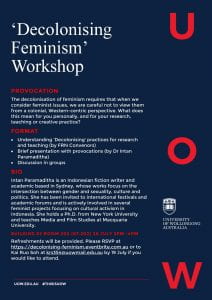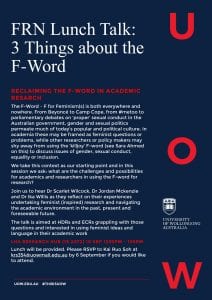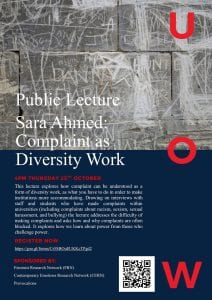ZOOM – TUESDAY 25th AUGUST 4:00pm – 5:30pm
This virtual roundtable event has been conceived as a response to the uncertain employment conditions in higher education, exacerbated by the impacts of COVID-19. With government funding changes and various structural changes within the university, this virtual roundtable seeks to explore what those within the university sector can do to support prospective and precariously employed academic staff. The event will be split between a panel conversation and audience Q&A/discussion. The panel includes higher degree research students, early career researchers, and ongoing professional and academic staff. We welcome students and staff from all levels of higher education, particularly those with an interest in how the precarious workplace affects higher education and academic research in Australia.
TO ATTEND:
Please register your interest at https://frnpowerandprecarity.eventbrite.com.au
PANELLISTS
Dr. Jessica Ford is a Lecturer in Film, Media and Cultural Studies at the University of Newcastle (UON), Australia. She is a feminist television studies scholar and has been published in Feminist Media Studies and The Australasian Journal of Popular Culture. Along with other members of The Academic Precariat collective, she co-authored ‘What Ongoing Staff Can do to Support Precariously Employed Colleagues ‘ (2020) for the Australian Universities’ Review. Jessica is currently working on creating professional development and mentoring opportunities for Sessional Academics in the School of Humanities and Social Sciences at UON.
Sarah Ryan is a project manager with Careers Central at the University of Wollongong (UOW). Sarah leads a small team of careers consultants to embed career development learning in curricular and co-curricular contexts. She is a qualified careers practitioner and had particular responsibility in supporting higher degree research (HDR) students between 2013-2018 at UOW, and as part of her previous role at Trinity College in Dublin, Ireland. Presently, she delivers the careers group sessions as part of the Graduate Research School HDR student workshops and seminars.
Dr. Quah Ee Ling Sharon (she/her) is Senior Lecturer in Sociology at the University of Wollongong (UOW). She is the recipient of the Vice-Chancellor’s Rosemary Cooper Equity, Diversity and Inclusion Award in 2020. She serves as the Chair of Ally Network, and is actively involved in Forging United Safe Environments (FUSE) Network, Workforce Diversity Reference Group and Academic Senate. She works closely with a group of casual tutors in her role as the subject coordinator of SOC103 Introduction to Sociology and SOC227 Genders & Sexualities at UOW.
Dr. Kate Bowles is the Associate Dean International for the Faculty of Arts Social Sciences and Humanities (ASSH) at the University of Wollongong (UOW) and an advocate for fair work in higher education. She is currently working with an international group on the need for universities to support the development of critical labour literacy as a counter-narrative to “job-ready graduates.” Kate writes online about the casualisation of work in her blog: http://musicfordeckchairs.com/blog/category/work-and-working/casualisation-of-work/.
A/ Prof. Brogan Bunt is Head of School of The Arts, English and Media (TAEM) in the Faculty of the Arts, Social Sciences and Humanities (ASSH) at the University of Wollongong (UOW). TAEM depends upon a large group of casual staff who do a considerable amount of the school’s teaching. Their conditions have increasingly deteriorated over the past few years and have now reached a point of crisis. As a frontline manager, Brogan is very aware of the constraints of the current system and recognises the key responsibility to conceive, advocate for and foster new systems that assist casuals to achieve better university recognition, support and employment conditions.
Panel moderated by Amy Boyle, who is currently completing a Doctor of Philosophy (Arts) in the School of Arts, English and Media (TAEM) at the University of Wollongong (UOW). As well as being the higher degree research (HDR) convener of the UOW Feminist Research Network, Amy is a member on the HDR Training Advisory Committee. As part of this role, in 2019 Amy undertook Research Assistance for the Acting Dean of Graduate Research, A/Prof. Honglin Chen, researching how HDR training might be re-envisioned to better suit the needs of students in the contemporary research and work contexts.
–
For more information please contact Amy Boyle at amyboyle@uow.edu.au




